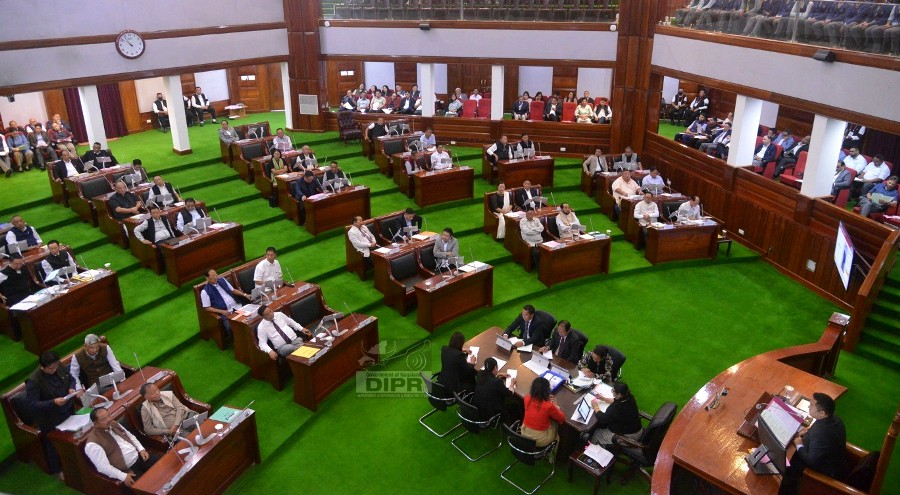MLA A Pongshi Phom raises concerns over GST revenue leakages, urging reforms and stakeholder engagement during the Assembly session on Tuesday.
Share

KOHIMA — Legislator A Pongshi Phom on Tuesday suggested the formation of a State GST Grievance Redressal Committee comprising government representatives, trade bodies, tax practitioners and professionals.
Raising the matter during zero hour under Rule 49, Phom said such a body could hold quarterly consultations to reflect the views of the state and its people, while addressing grievances and suggesting reforms.
He noted that GST, introduced in July 2017 under the “One Nation, One Tax” framework, had replaced multiple levies and removed cascading taxes. For Nagaland, he said GST had become the backbone of state revenue, with every individual contributing to it through consumption.
Phom said Nagaland had potential to boost GST revenue by developing industries in food packaging and bio-fuels, which would also create jobs. He pointed out that GST revenue in the state had grown sharply, recording 104% year-on-year growth in June 2025, following 43% in April and 44% in May. The rise, he said, was due to internal reforms, enforcement and improved compliance.
More from 7th NLA sessions: Finance Commission, Flood Plain Zoning bills introduced in Nagaland Assembly
MLA Kuzholuzo Nienu cautions against hasty decisions on job reservation quota in Nagaland
“The State Taxes department attributes this surge to internal reforms, skill development, enhanced enforcement measures, and improved compliance by the business community,” he said.
To further enhance revenue collection, he suggested creating greater awareness on GST compliance, including on commercial rent (18%) and billing for sand and stone chips (5%), and called for stricter checks on transporters moving goods without documentation.
Phom also pressed for revision of GST registration thresholds, fixed in 2017 at INR 20 lakh for goods and INR 10 lakh for services. Considering inflation, he argued the limits should now be doubled to support first-generation entrepreneurs.
WATCH MORE:
He further said government departments, being under GST purview, must ensure timely filing of monthly TDS returns (GSTR-7) on deductions made.
He pointed out lapses where departments demanded Tax Clearance Certificates (TCC) without first uploading 2% deductions, blocking contractors’ working capital. He urged that DDOs ensure compliance before insisting on TCCs.
Preventing leakage top priority—CM
Responding, Chief Minister Neiphiu Rio acknowledged Phom’s concerns and said preventing revenue leakage remained a top government priority. He said GST was the state’s main resource, with major policy decisions taken at the GST Council, where Nagaland is being represented by Minister KG Kenye.
Rio informed that the upcoming council meeting on Sep. 3 and 4 would discuss lowering some GST rates. He appreciated the State Tax Department for tightening compliance, closing loopholes and improving collections, though he noted a large share of revenue still comes from government work contracts.
More from 7th NLA sessions: Centre urged to review enforcement of Protected Area Permit in Nagaland—CM Rio
“Therefore, preventing leakage in this area is one of the government’s top agenda,” he said.
Highlighting the role of TDS and TCC in curbing tax evasion, Rio said departments must ensure deductions are deposited and returns filed promptly.
Filing these returns, he said, is essential as it creates an audit trail showing which contractors were awarded and what payments were received.
Failure to file returns, however, leads to revenue loss.
He stressed that TCCs certify GST payment, allowing contractors to reclaim withheld amounts. Departments, he maintained, are legally bound to release these amounts once a TCC is produced.
While stressing that compliance with TDS and TCC rules protects both government revenue and contractors’ interests, Rio expressed concern over lapses by departments and DDOs, which recent State Tax Department studies revealed have led to leakages. He said corrective measures will be taken and urged contractors to report cases where withheld amounts are not reimbursed despite a valid TCC.
He further called on stakeholders to submit specific complaints instead of general allegations. Rio noted that the Tax Department is working to maximise state revenue and appealed for public support to make it a collective effort. He encouraged people to demand proper GST bills, use digital payments, and report tax evasion, even through social media.
The chief minister also stressed the need to create a supportive ecosystem for young entrepreneurs so that they can participate in business with confidence. He assured the House that a GST Grievances Committee, comprising business representatives, the government, and experts, would address issues.
Rio added that optimising tax revenue is the first step towards self-reliance and better fund devolution. While Nagaland is exempt from property tax and income tax, he said businesses must pay GST, noting that although the culture of paying tax is new in the state, people must adopt it as no government can function without revenue.
He expressed hope that with greater compliance, Nagaland will be able to take up more development works.